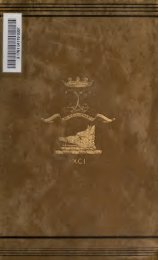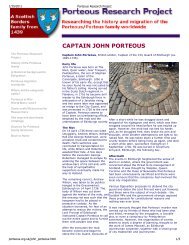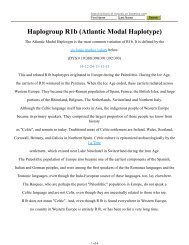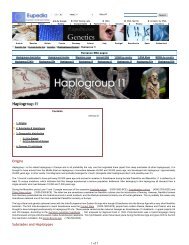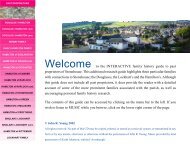The Archaeology of Britain: An introduction from ... - waughfamily.ca
The Archaeology of Britain: An introduction from ... - waughfamily.ca
The Archaeology of Britain: An introduction from ... - waughfamily.ca
Create successful ePaper yourself
Turn your PDF publications into a flip-book with our unique Google optimized e-Paper software.
• 160 • Simon Esmonde Cleary<br />
petrology, in its ability to source fabrics <strong>of</strong> the ubiquitous Romano-British pottery and thus help<br />
to establish patterns <strong>of</strong> distribution (Peacock 1982). <strong>The</strong> biologi<strong>ca</strong>l sciences, on the other hand,<br />
have made possible major advances in our understanding <strong>of</strong> the ecology <strong>of</strong> Roman <strong>Britain</strong>. This<br />
has enabled us to dispense with the traditional reliance on the Roman agrarian writers Cato,<br />
Varro and Columella, who were concerned with the Mediterranean slave agriculture <strong>of</strong> Italy, and<br />
replace it with an understanding based on the evidence <strong>from</strong> <strong>Britain</strong> itself. This has particularly<br />
been developed <strong>from</strong> osteology for wild and domesti<strong>ca</strong>ted animals, and by palynology and<br />
palaeobotany for staple and relish crops and the overall management <strong>of</strong> the countryside and its<br />
resources such as woodland.<br />
Most important and striking have been the changes in the intellectual framework within which<br />
the study <strong>of</strong> Roman <strong>Britain</strong> takes place. For the quarter-century or so after the Second World<br />
War, such study was strongly empiri<strong>ca</strong>l, its analyses dominated by questions and approaches<br />
derived ultimately <strong>from</strong> the surviving literary sources along with epigraphic (inscription) evidence<br />
(e.g. Salway 1993). This was particularly true <strong>of</strong> the military archaeology <strong>of</strong> Roman <strong>Britain</strong>, but<br />
the tiny number <strong>of</strong> references to affairs in the civil side <strong>of</strong> the Province had a quite disproportionate<br />
effect. Ex<strong>ca</strong>vation concentrated on ‘Roman’ sites such as towns and villas, and explanatory models<br />
were <strong>of</strong>ten drawn either <strong>from</strong> Classi<strong>ca</strong>l authors (appropriate or not) or consciously or implicitly<br />
<strong>from</strong> the experiences <strong>of</strong> the modern British land-owning and edu<strong>ca</strong>ted classes. <strong>The</strong>y projected<br />
back onto the Roman Empire the experiences and preconceptions <strong>of</strong> the elite <strong>of</strong> a modern<br />
imperial/colonial power.<br />
<strong>The</strong> successive intellectual movements and fashions that have swept archaeology over the<br />
last 30 years or so have taken their time to dislodge this well-established tradition; some have<br />
failed to make headway against indifference or antipathy. In other <strong>ca</strong>ses, the close relationship<br />
between data and the generation and appli<strong>ca</strong>tion <strong>of</strong> theoreti<strong>ca</strong>l approaches has meant that<br />
approaches devised for other areas or periods have not been seen as appropriate for the Roman<br />
period, particularly when confronted with the great quantity and range <strong>of</strong> data <strong>from</strong> that period.<br />
Nonetheless, with the rise <strong>of</strong> a generation that has grown up in and after <strong>Britain</strong>’s own retreat<br />
<strong>from</strong> Empire and that has been trained as archaeologists rather than historians, a change is<br />
coming about. Gradually, a Romano-British intellectual synthesis is being formed through the<br />
interaction <strong>of</strong> new ideas and approaches <strong>from</strong> external sources with the indigenous database<br />
and epistemology. Its characteristics include a marked concern for making explicit the theoreti<strong>ca</strong>l<br />
approaches <strong>of</strong> both past and present work, be it ex<strong>ca</strong>vation or analysis. Allied with this is a<br />
concern for the quantifi<strong>ca</strong>tion <strong>of</strong> data, its statisti<strong>ca</strong>l manipulation and graphic display, which<br />
are particularly welcome in such a data-rich period. This has been underpinning the development<br />
<strong>of</strong> an explanatory framework centring on social structures and development, reflecting the<br />
importance <strong>of</strong> the ‘processualist’ school <strong>of</strong> thought (Chapter 1) in recent British archaeology.<br />
It also seems particularly appropriate for investigating the processes that make up the<br />
phenomenon <strong>of</strong> Romanization. Romanization was also a matter <strong>of</strong> more than the social,<br />
however, and the concerns <strong>of</strong> post-processual thought with the symbolism and the mentalités<br />
<strong>of</strong> societies are beginning to impinge on Romano-British studies, as are other strands such as<br />
the archaeology <strong>of</strong> gender. <strong>The</strong> post-imperial consciousness <strong>of</strong> many workers is to be seen in<br />
the increasing commitment to the less visibly Romanized part <strong>of</strong> the Romano-British population,<br />
for instance in the north and west, and to the reasons and choices that lay behind the rejection<br />
(or non-acceptance) <strong>of</strong> a Romanized culture (cf. TRAC 1993). <strong>The</strong>se theoreti<strong>ca</strong>l developments<br />
co-exist, however, with a still strong, continuing empiri<strong>ca</strong>l tradition, represented by the ex<strong>ca</strong>vation<br />
and the publi<strong>ca</strong>tion <strong>of</strong> sites and <strong>of</strong> works on classes <strong>of</strong> material or other aspects <strong>of</strong> the<br />
archaeology <strong>of</strong> Roman <strong>Britain</strong>.


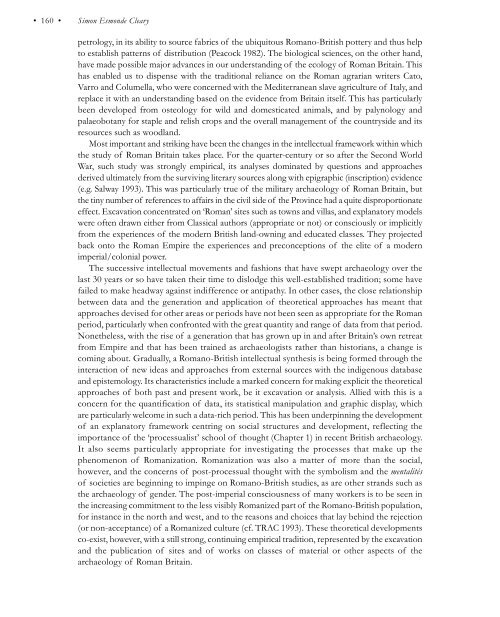


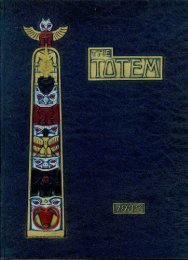

![SS Sir Francis [+1917] - waughfamily.ca](https://img.yumpu.com/49438251/1/190x245/ss-sir-francis-1917-waughfamilyca.jpg?quality=85)


